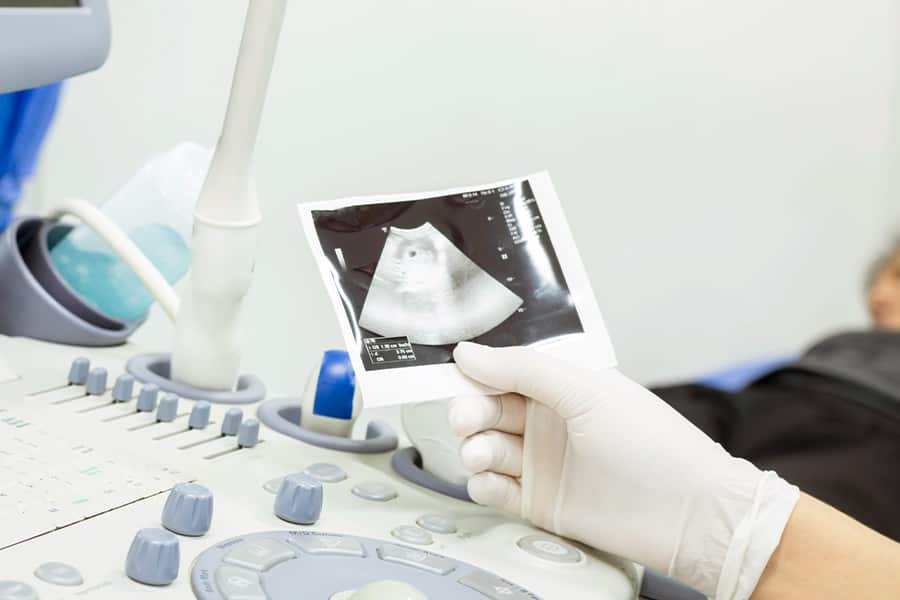
Ultrasound scans provide valuable information about the health and development of the fetus. In most pregnancies, routine ultrasound examinations are typically conducted soon after the first missed period, at 8-12 weeks, and again at 18-20 weeks. There are situations where additional ultrasounds may be necessary. In this article we will explore why you might require multiple ultrasounds during your pregnancy, focusing on complications and non-normative circumstances that require closer monitoring.
If you have been diagnosed as having a high-risk pregnancy, healthcare providers may recommend more frequent ultrasound examinations to closely monitor the well-being of both you and your baby. High-risk factors can include maternal health conditions like diabetes, hypertension, advanced maternal age, or previous complications in pregnancy. Multiple ultrasounds allow healthcare professionals to assess fetal growth, blood flow, and other parameters to detect any potential issues early on and provide appropriate management.

Pregnancies with multiple fetuses require more extensive monitoring due to the increased complexity and potential risks associated with these pregnancies. Multiple gestations, such as twins or triplets, often require more frequent ultrasounds to assess individual fetal growth. Your provider will need to evaluate the health of each baby and monitor for complications specific to multiple pregnancies, such as twin-to-twin transfusion syndrome (TTTS) or placental abnormalities.
If there are suspected fetal abnormalities detected during routine ultrasound examinations, additional ultrasounds may be necessary to further evaluate and assess the condition. These abnormalities can include structural defects, genetic conditions, or suspected problems with fetal development. Additional ultrasounds, including specialized scans like a targeted or detailed fetal anatomy scan, can provide more detailed information to help guide treatment decisions or provide specialized care.
Certain maternal or fetal complications may necessitate additional ultrasound scans throughout the pregnancy. These complications can include placental issues (such as placenta previa or placental insufficiency), reduced fetal movements, abnormal amniotic fluid levels, or concerns related to the umbilical cord. Frequent ultrasound examinations enable healthcare providers to closely monitor the progression of these complications, assess fetal well-being, and make informed decisions about the timing of delivery or the need for further intervention.
In cases of suspected fetal growth restriction or excessive fetal growth (macrosomia), more frequent ultrasounds may be recommended to assess the baby's growth and well-being. Growth scans help healthcare providers estimate fetal weight, measure key parameters such as abdominal circumference and head circumference and monitor the overall growth pattern. These scans can assist in identifying any issues that may require closer monitoring or medical intervention.

Each pregnancy is unique and there may be specific patient circumstances that warrant additional ultrasound scans. These could include personal preferences, previous pregnancy complications, or healthcare provider recommendations based on individual factors. It is important to have open communication and discussions with your healthcare provider to address any concerns or specific needs you may have.
Certain situations during pregnancy may necessitate more than the usual three ultrasounds. Complications, high-risk factors, multiple gestations, suspected abnormalities, and individual patient circumstances may require closer monitoring and more frequent assessments. Additional ultrasounds play a crucial role in ensuring the well-being of both the pregnant woman and the fetus, allowing healthcare providers to detect and manage complications early and provide personalized care. Listen to the advice of your healthcare team and consider additional ultrasound exams as opportunities to monitor you and your baby's health and increase the chance for a safe and healthy pregnancy.
The information is presented as a general guide to present information on the need for multiple ultrasounds during pregnancy. It is for informational purposes only. The information provided is not intended to be the only information available about the need for multiple ultrasounds during pregnancy. The material provided is not expected to be a substitute for advice or information from your physician or health care provider.
If you have any questions, concerns, apprehensions, unease, or worry about the need for multiple ultrasounds during pregnancy contact your health care provider immediately.


ALL WARRANTIES OF ANY KIND WHATSOEVER EXPRESS, IMPLIED, AND STATUTORY, ARE HEREBY DISCLAIMED. ALL IMPLIED WARRANTIES OF MERCHANTABILITY AND FITNESS FOR A PARTICULAR PURPOSE ARE HEREBY DISCLAIMED. THE PRODUCTS SOLD, INCLUDING SONOGRAMS, ULTRASOUNDS, FAKE PREGNANCY DOCUMENTS, AND FAKE PREGNANCY TESTS ARE SOLD ‘AS IS’ BASIS.
THE SITE CANNOT AND DOES NOT CONTAIN [MEDICAL/ LEGAL/ FITNESS/ HEALTH/ OTHER] ADVICE. THE INFORMATION IS PROVIDED FOR PRANKS PURPOSES ONLY AND IS NOT A SUBSTITUTE FOR PROFESSIONAL ADVICE.
ACCORDINGLY, BEFORE TAKING ANY ACTIONS BASED UPON SUCH INFORMATION, WE ENCOURAGE YOU TO CONSULT WITH THE APPROPRIATE PROFESSIONALS. WE DO NOT PROVIDE ANY KIND OF MEDICAL/ LEGAL/ FITNESS/ HEALTH ADVICE. THE USE OR RELIANCE OF ANY INFORMATION CONTAINED ON THIS SITE, OR OUR MOBILE APPLICATION, IS SOLELY AT YOUR OWN RISK.
THIS WEBSITE DOES NOT PROVIDE MEDICAL ADVICE. THE INFORMATION, INCLUDING BUT NOT LIMITED TO, TEXT, GRAPHICS, IMAGES AND OTHER MATERIAL CONTAINED ON THIS WEBSITE ARE FOR PRANK PURPOSES ONLY. NO MATERIAL ON THIS SITE IS INTENDED TO BE A SUBSTITUTE FOR PROFESSIONAL MEDICAL ADVICE, DIAGNOSIS OR TREATMENT. ALWAYS SEEK THE ADVICE OF YOUR PHYSICIAN OR OTHER QUALIFIED HEALTH CARE PROVIDER WITH ANY QUESTIONS YOU MAY HAVE REGARDING A MEDICAL CONDITION OR TREATMENT AND BEFORE UNDERTAKING NEW HEALTH CARE REGIMEN, AND NEVER DISREGARD PROFESSIONAL MEDICAL ADVICE OR DELAY IN SEEKING IT BECAUSE OF SOMETHING YOU HAVE READ ON THIS WEBSITE.
THE PARTIES AGREE THAT ANY PRODUCT PURCHASED ON THE BABY MAYBE WEBSITE SHALL NOT BE USED FOR ANY PROPOSE OTHER THAN AS A PRANK. WITHOUT EXCEPTION NO BABY MAYBE PRODUCT SHALL BE PROVIDED/SUBMITTED TO ANY GOVERNMENTAL OR OTHER AGENCY, MEDICAL DOCTOR, ARBITER OF A DISPUTE, AS PROOF OF PREGNANCY, PAST OR CURRENT, OR TO CLAIM ANY BENEFIT FOR WHICH A PREGNANT WOMAN MAY BE ELIGIBLE, OR ENTITLED TO RECEIVE, BASED ON HER BEING PREGNANT. NO HIPAA PROTECTED PATIENT HEALTH INFORMATION CONNECTED TO ANY BABY MAYBE PRODUCT, IS INTENDED, OR CONVEYED, WITH RESPECT TO THIS SALE.
THE PARTIES AGREE THAT BABYMAYBE IS NOT RESPONSIBLE FOR ANY LIABILITY WHATSOEVER FOR DELAYS IN SHIPPING THE PRODUCT. THE PARTIES FURTHER AGREE THAT THE SOLE REMEDY FOR ANY SHIPPING DELAYS IS THE REFUND OF THE PURCHASER’S PAYMENT FOR THE PRODUCT.
THE PARTIES AGREE THAT THE FORUM FOR ANY LEGAL ACTION ASSOCIATED WITH THE SALE AND PURCHASE OF THE PRODUCT IS THE STATE OF ILLINOIS.